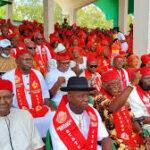Former Labour Party presidential candidate, Peter Obi, has criticised the Tinubu administration’s handling of the fuel subsidy removal, describing it as rushed, uncoordinated, and lacking in transparency.
In a recent interview with ARISE News, Obi clarified his long-standing position on the controversial issue, saying he supports the removal of fuel subsidy but would have approached it in a more structured and strategic manner.
“I have consistently maintained that I would have removed the fuel subsidy,” Obi said, referencing his 2023 campaign manifesto. “What is wrong is the haphazard way in which it was announced and implemented. Everyone knows the subsidy regime was riddled with corruption. But there’s a need to dismantle it in an organised way.”
According to Obi, the stated reason for the removal—to save funds and reduce borrowing—remains valid, but the government has failed to demonstrate how the savings are being utilised.
“We were told the money saved would be invested in critical areas of development,” he said. “Now the question is: where are those billions? Where exactly have they been invested?”
Obi also criticised the floating of the naira, noting that while he supports the concept in principle, such a policy requires a productive economy to be effective.
“There’s nothing wrong with floating your currency or even devaluing it—if your economy is productive,” he explained. “Floating makes your exports more competitive, but in a country with little to export, it leads to inflation and hardship. It’s a double blow.”
Pressed on how he would have handled both fuel subsidy removal and naira floatation, Obi emphasised the need for a clear national plan, stakeholder engagement, and targeted investment.
“I would sit down with sector operators, agree on a pricing structure, and ensure that savings from subsidy removal are transparently directed into priority areas—like infrastructure, education, and healthcare,” he said.
Obi argued for a national development plan to coordinate how resources are used and called for transparency in government spending.
“It’s not just about removing subsidies or floating currency. It’s about doing it in a planned, phased, and transparent manner—so people see the benefits and not just the pain.”
He concluded by stressing the importance of production-driven policies, especially in agriculture and manufacturing, before implementing such significant economic reforms.
Nzubechukwu Eze









